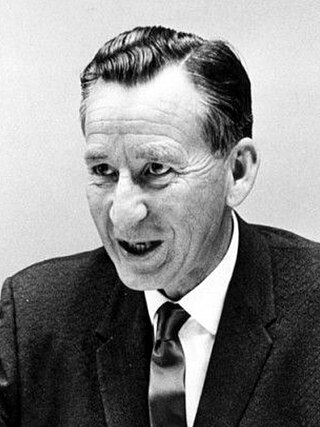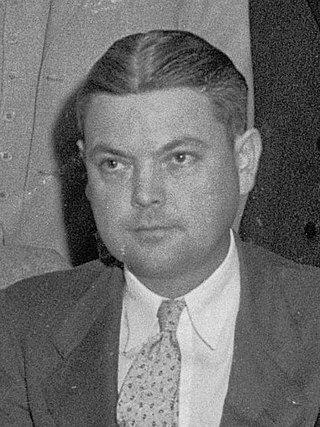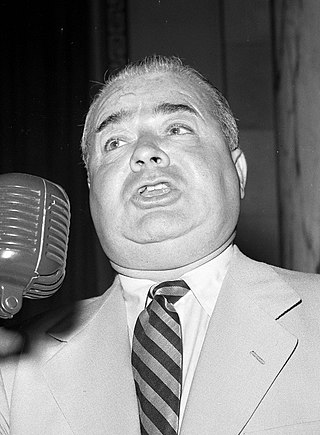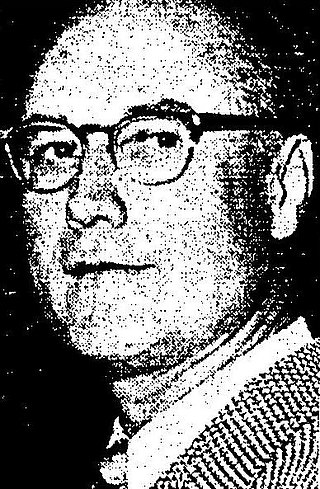
John Russel Roden (born ca. 1918) was elected to the Los Angeles City Council in 1946 to succeed Meade McClanahan, who was recalled from office. Roden served until mid-1947 and was defeated for reelection.

John Russel Roden (born ca. 1918) was elected to the Los Angeles City Council in 1946 to succeed Meade McClanahan, who was recalled from office. Roden served until mid-1947 and was defeated for reelection.
Roden was a U.S. Army transport pilot during World War II. [1] He was married on September 18, 1946, to Nadine Romoli. They were divorced in January 1952. After his council service ended in 1947, he was a television manufacturing executive and an encyclopedia salesman. [2] [3]
See also List of Los Angeles Municipal Election Returns, 1946–47
City Councilman Meade McClanahan faced a recall election on March 19, 1946, brought about by public dissatisfaction in Los Angeles City Council District 13 with his auditorium appearances with political leader Gerald L. K. Smith, the founder of the America First Party. Roden, 28, was the candidate put forth by the forces proposing the recall, [4] which was approved by a vote of 12,394 to 8,913. He won the accompanying election to fill the rest of McClanahan's term by 11,394 votes to 1,028 for Hubert Wallis and 929 for John P. McGinley. [1] He took the oath of office on March 28, 1946. [5] In those days the district represented Silver Lake and an area west of downtown to Vermont Avenue and south to Valley Boulevard. [6]
In the mid-1947 municipal elections, Roden faced State Assembly Member Ernest E. Debs, who finished first in the primaries but without a majority. In the final election, Debs was elected by a vote of 15,932 to 11,746 for Roden.
Late in 1947 Roden attempted to run for the California State Assembly but was ruled off the ballot by a judge because he had filed his affidavit of candidacy shortly before midnight on September 30 instead of observing a 5 p.m. deadline. [7]
Incinerator, 1946. Roden drew the ire of "hundreds of angry citizens" who crowded the City Hall to protest the building of a city incinerator at Avenue 28 and Lacy Streets in Lincoln Heights. Roden had voted in favor of the incinerator just a few months earlier. [8]
Film strike, 1946. Roden was the only council member opposing the offer of a reward of $1,000 in connection with November 1946 violence occurring during a strike of film technicians at Columbia Studios. [9] Late in the year, as the strike lingered, a Roden resolution asking for arbitration drew the ire of Councilman Ed J. Davenport, who said:
Roden has shown his bias in this matter right along. He cast the one vote against this Council offering a reward for the detection of bomb throwers and he tried to get the Health Department to condemn the City Jail, so that arrested strike pickets would be released. [10]
Communism, 1947. The feud continued the next year with Davenport submitting a resolution asking that the council be kept informed about "the progress of various bills before the Congressional Committee on Un-American Activities." Roden and Davenport traded "epithets" over the measure. [11]

Everett Glen Burkhalter, who went by Everett G. Burkhalter, was an American film studio electrician who turned to politics in 1941 and became a member of the California State Assembly, the Los Angeles City Council and the U.S. Congress in the middle part of the 20th century.

Charles Navarro Guarino was a Los Angeles, California, City Council member between 1951 and 1961 and city controller from 1961 to 1977.

Joseph E. Hollingsworth (1908–1975), who went by Joe E. Hollingsworth, was appointed in 1961 to replace Charles Navarro as Los Angeles City Council member for the racially mixed 10th district. He served for two years until he was ousted by retired policeman and future mayor Tom Bradley. He was the last Caucasian council member from that district.

Charles A. Allen (1884–1964) was an American politician. He was a member of the Los Angeles City Council from 1941 to 1947.

Harold A. Henry (1895–1966) was a community newspaper publisher who was elected to the Los Angeles City Council in 1945 and was its president for four terms from 1947 to 1962.

Ernest Eugene Debs was a California State Assembly member from 1942 to 1947, a Los Angeles city councilman from 1947 to 1958 and a member of the Los Angeles County Board of Supervisors from 1958 to 1974.

Stephen W. Cunningham was the first graduate manager at the Southern Branch of the University of California, later UCLA, and a member of the Los Angeles City Council from 1933 to 1941.

Martin Ludlow is president and chief executive officer of Bridge Street, Inc., a Los Angeles-based live entertainment development company.

Leland S. Warburton, also known as Lee Warburton, was a member of the Los Angeles City Council from 1945 to 1953.

Ira J. McDonald (1895–1964) was a Downey, California, attorney and City Council member in Los Angeles, California, between 1941 and 1945.

Los Angeles City Council District 12 is one of the 15 districts of the Los Angeles City Council. It encompasses the northwestern and western section of the San Fernando Valley, in the city of Los Angeles. It is represented by John Lee.

Howard Woster Davis was a member of the California State Assembly for two years and of the Los Angeles City Council for 16 years. He was indicted on charges of accepting bribes to influence his actions as a city official but was cleared on one count and never tried on the others, which were dismissed.

Earl C. Gay (1902–1972) was a registered pharmacist who was a member of the Los Angeles City Council between 1933 and 1945.

Carl Christian Rasmussen (1901–1952) was a Lutheran minister who was also a member of the Los Angeles, California, City Council between 1939 and 1947.

Harold Harby (1894–1978) was elected to the Los Angeles, California, City Council in 1939, but he had to leave office in 1942 when he was convicted of using a city car for a trip out of the state. He was reelected in 1943 and served until 1957. Harby was noted for casting a 1951 swing vote that killed a $100 million proposal to build a massive public-housing project in the city as well as for his opposition to modern art and music.

Ed J. Davenport (1899–1953) and Harriett Davenport (1894–1976), a married couple, were both members of the Los Angeles, California, City Council. The wife succeeded her husband in the position after he died in 1953. It was the first of two such spousal turnovers in the history of the city. Harriett Davenport was the third woman council member in the city's history and the first to be appointed by the council.

Thomas Meade McClanahan Jr. was an industrial engineer and businessman who was elected to the Los Angeles City Council in 1945 but was ousted by voters in 1946 based upon his support for controversial preacher and political organizer Gerald L. K. Smith.

Don A. Allen, also known as Don A. Allen, Sr., was a member of the California State Assembly in the 1940s and 1950s and of the Los Angeles City Council between 1947 and 1956.

Ransom M. Callicott was president of the National Restaurant Association, co-founder of Meals for Millions and a member of the Los Angeles, California, City Council from 1955 until his death. He was one of the doubters of the proposal to bring the baseball Dodgers from Brooklyn and install them in a new stadium in Chavez Ravine, insisting upon carefully examining the plans for the stadium before it was built.

James Potter Davenport (1841–1905) was a Los Angeles, California, City Council member who was the first official in the United States to be removed from office in a recall election.
Access to the Los Angeles Times links may require the use of a library card.